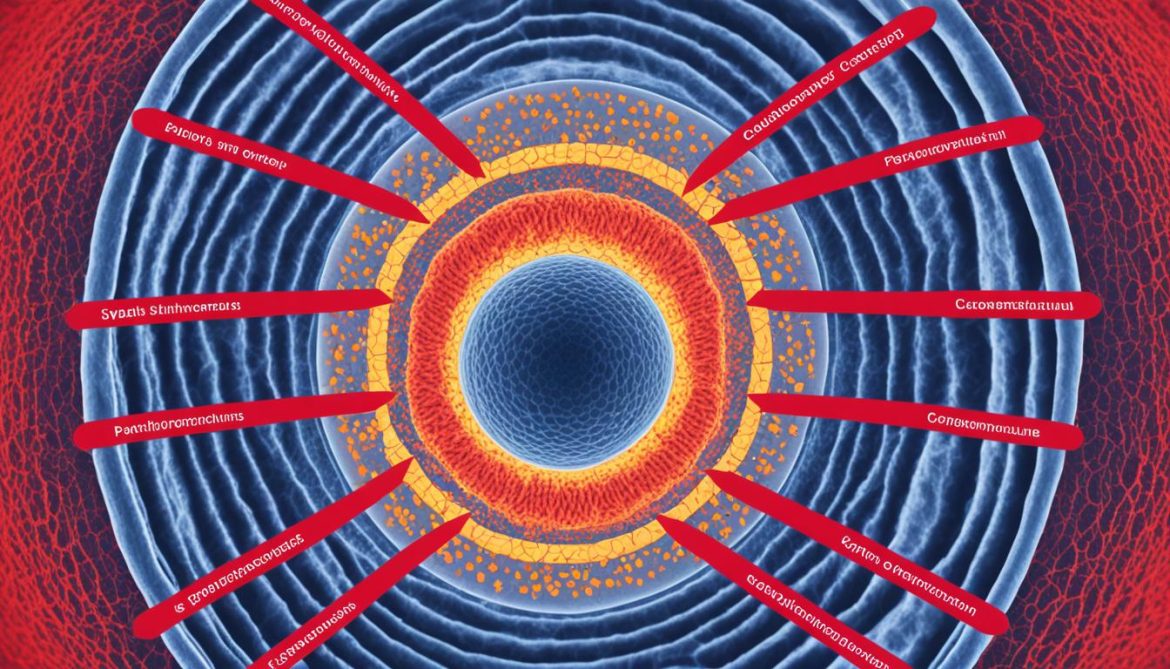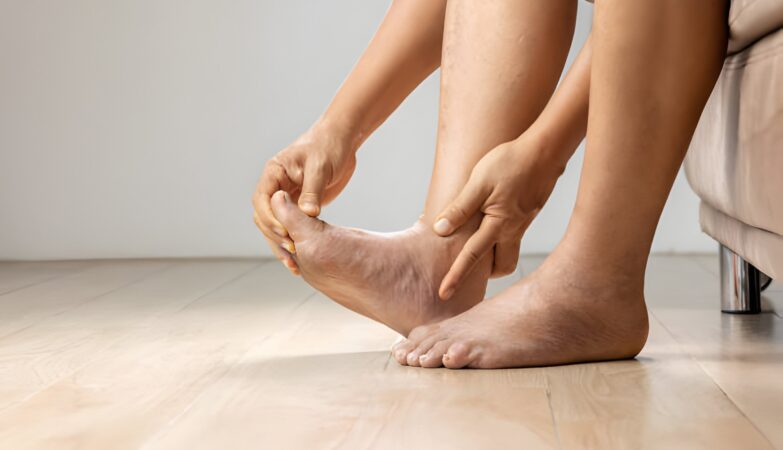If you’ve ever experienced painful intercourse, also known as dyspareunia, you’re not alone. Many women encounter this issue at some point in their lives. It’s essential to understand why intercourse pain happens and address the underlying causes for a more comfortable and satisfying intimate experience.
Key Takeaways:
- Painful intercourse, or dyspareunia, can occur for various physical and psychological reasons.
- Physical causes of painful intercourse include insufficient lubrication, medications, injury or trauma, inflammation or infection, vaginismus, and structural issues.
- Emotional factors such as anxiety, depression, stress, body image concerns, and a history of sexual abuse can contribute to dyspareunia.
- Common symptoms of painful intercourse include pain at sexual entry, deep pain during thrusting, burning or aching pain, and throbbing pain after intercourse.
- Diagnosis and treatment of dyspareunia involve consulting a healthcare provider who can identify the underlying cause and recommend appropriate remedies.
Now that you have a glimpse of what will be covered in this article, let’s delve deeper into the physical and emotional causes of painful intercourse, the symptoms to look out for, and how to diagnose and treat this condition. Remember, addressing the issue is vital for a pain-free and satisfying intimate experience.
Physical Causes of Painful Intercourse
Painful intercourse, also known as dyspareunia, can have several physical causes, depending on the location of the pain. Understanding these causes is crucial in addressing the issue and finding effective treatments.
Entry Pain
Entry pain refers to discomfort or pain that is experienced during penetration. It can be caused by various factors, including:
- Insufficient lubrication: Inadequate natural lubrication can result in friction and discomfort during intercourse.
- Certain medications: Some medications can cause vaginal dryness or affect sexual function, leading to pain during penetration.
- Injury or trauma: Previous injuries or trauma to the genital area can make intercourse painful.
- Inflammation or infection: Conditions such as vaginal infections or inflammation can cause discomfort or pain during sexual activity.
- Vaginismus: Vaginismus is a condition where the muscles in the vaginal area involuntarily tighten, making penetration painful or impossible.
- Structural issues: Structural issues like vaginal agenesis (absence of the vagina) or an imperforate hymen (a hymen that completely covers the vaginal opening) can result in pain during intercourse.
Deep Pain
Deep pain refers to pain that is felt during deep penetration. It can be caused by various conditions and treatments, including:
- Endometriosis: Endometrial tissue growing outside the uterus can cause pain during deep penetration.
- Pelvic inflammatory disease: Inflammation or infection in the reproductive organs can result in deep pain during intercourse.
- Uterine prolapse: Uterine prolapse, where the uterus descends into the vaginal canal, can lead to discomfort or pain during deep penetration.
- Surgeries or medical treatments: Surgeries like hysterectomy or medical treatments like radiation or chemotherapy can cause changes in the pelvic area that result in deep pain during intercourse.
It’s important to consult with a healthcare provider to determine the exact cause of your painful intercourse and develop an appropriate treatment plan.
Emotional Factors Contributing to Painful Intercourse
Emotional factors can have a significant impact on experiencing pain during intercourse. Psychological issues, such as anxiety, depression, body image concerns, fear of intimacy, and relationship problems, can contribute to discomfort and pain. When you are dealing with these psychological issues, it can be challenging to fully relax and enjoy the intimate experience, leading to increased pain.
Stress is another emotional factor that can contribute to painful intercourse. When you are stressed, your body releases stress hormones, which can cause the muscles of the pelvic floor to tense up. This tension can lead to pain and discomfort during penetration.
Furthermore, a history of sexual abuse may also contribute to dyspareunia. Traumatic experiences can have long-lasting effects on a person’s mental and physical well-being, including their sexual health. It is essential to seek support and professional help to address any emotional trauma related to sexual abuse. Your healthcare provider or a therapist who specializes in trauma can guide you through the healing process and help reduce the impact of past experiences on your intimate life.
Remember, experiencing pain during intercourse is not just physical; your emotional well-being is also crucial in promoting a satisfying and pain-free intimate experience.
Effects of Emotional Factors on Painful Intercourse
When you are dealing with emotional factors, they can exacerbate the physical symptoms of painful intercourse. For instance, anxiety and fear of pain can cause muscle tension, making penetration more uncomfortable. Relationship problems or unresolved issues can create a lack of trust and emotional connection, further contributing to pain and discomfort during sex.
It is essential to address these emotional factors as part of the overall treatment plan for painful intercourse. Seeking therapy or counseling, both individually and as a couple, can be beneficial in managing psychological issues and facilitating open communication about sexual needs and boundaries.
Managing Emotional Factors for a Better Intimate Experience
Here are some strategies that can help manage and reduce the impact of emotional factors on painful intercourse:
- Seek professional help: A therapist or counselor specializing in sexual health and intimacy can provide guidance and support in addressing psychological issues.
- Practice stress management techniques: Engage in activities that help reduce stress, such as exercise, meditation, deep breathing exercises, or engaging in hobbies you enjoy.
- Communicate openly with your partner: Discuss any fears or concerns you may have about intimacy and pain. Open communication can foster trust and understanding.
- Explore alternative sexual activities: If penetration is painful, try focusing on other forms of sexual pleasure that do not cause discomfort. Experimenting with non-penetrative activities can help maintain a satisfying intimate connection.
- Consider couple’s therapy: If relationship issues contribute to painful intercourse, couple’s therapy can help improve communication and strengthen the emotional bond between partners.
| Emotional Factors | Impact on Painful Intercourse |
|---|---|
| Anxiety and depression | Increased muscle tension, fear of pain during penetration |
| Body image concerns | Discomfort and self-consciousness, hindering relaxation |
| Fear of intimacy | Tension and difficulty letting go, leading to pain and discomfort |
| Relationship problems | Lack of trust and emotional connection, contributing to pain |
| History of sexual abuse | Emotional trauma, impacting sexual well-being |
By addressing the emotional factors contributing to painful intercourse, you can enhance your overall sexual well-being and enjoyment. Remember, seeking professional help and open communication are essential in navigating these emotional challenges and achieving a pain-free intimate experience.
Symptoms of Painful Intercourse
Painful intercourse can manifest in different ways, and understanding the symptoms can help identify the underlying causes. If you are experiencing recurrent pain during sex, it is important to seek medical attention to address the symptoms and find appropriate treatments. Here are some common symptoms to be aware of:
- Pain at sexual entry: Some women may feel pain only at the beginning of penetration, which can make sexual intercourse uncomfortable and challenging.
- Burning or aching pain: This symptom can be characterized by a burning or aching sensation in the genital area during or after sexual activity.
- Deep pain during thrusting: Deep pain can occur during deep penetration, causing discomfort and making sexual intercourse painful.
- Throbbing pain: Some individuals may experience throbbing pain that persists for hours after intercourse, indicating an underlying issue that needs to be addressed.
- Pain with every penetration: Painful intercourse may extend beyond sexual intercourse itself and be present during activities like using tampons.
If you are experiencing any of these symptoms, it is important to consult with a healthcare provider who can diagnose the cause of your pain and recommend appropriate treatments.
Diagnosing and Treating Painful Intercourse
Diagnosing the root cause of painful intercourse requires a thorough evaluation by a healthcare provider. During the examination, your healthcare provider will assess the underlying factors contributing to your discomfort.
Once the cause of the pain has been identified, your healthcare provider will recommend appropriate treatment options tailored to your specific needs.
| Treatment Approaches | Description |
|---|---|
| Medication | Depending on the cause of the pain, your healthcare provider may prescribe medications to alleviate symptoms or address any underlying medical conditions. |
| Hormone Therapy | In cases where hormonal imbalances are contributing to painful intercourse, hormone therapy may be recommended to restore balance and relieve discomfort. |
| Physical Therapy | Physical therapy sessions can help address muscle tension, weakness, or pelvic floor dysfunction that may be involved in dyspareunia. These sessions often include exercises and techniques to strengthen the pelvic floor muscles and improve flexibility. |
| Counseling and Psychotherapy | When emotional factors are contributing to painful intercourse, counseling or psychotherapy sessions may be beneficial. These sessions can help address underlying psychological issues and provide strategies to improve sexual well-being. |
| Lifestyle Changes | Simple lifestyle modifications, such as using water-based lubricants, practicing relaxation techniques, and exploring different sexual activities or positions, can often make a significant difference in reducing pain during intercourse. |
With the right diagnosis and treatment plan, it is possible to eliminate or significantly reduce the pain associated with dyspareunia. Consulting with a healthcare provider is crucial to ensure you receive the appropriate care and support to address your specific needs.
Natural Remedies and Self-Care for Painful Intercourse
In some cases, natural remedies and self-care practices can help alleviate the symptoms of painful intercourse. Here are a few strategies that you can try to manage your dyspareunia:
1. Use Water-Based Lubricants
Natural remedies for dyspareunia often involve addressing vaginal dryness. Using water-based lubricants can significantly improve lubrication during intercourse, reducing friction and discomfort. Look for lubricants that are free of added chemicals or irritants.
2. Avoid Irritants
When managing symptoms of painful intercourse, it’s essential to avoid irritants that may exacerbate discomfort. Stay away from scented products, such as soaps or feminine hygiene products, which can cause irritation and inflammation in the genital area.
3. Practicing Relaxation Techniques
Stress and anxiety can contribute to painful intercourse. Try incorporating relaxation techniques into your daily routine to reduce tension and promote physical and mental relaxation. Deep breathing exercises, meditation, and yoga can be effective in managing stress and improving overall well-being.
4. Experiment with Different Sexual Activities or Positions
Exploring alternative sexual activities or positions can help you find a more comfortable and pleasurable experience. Communicate openly with your partner about what feels good and experiment with different approaches that minimize pain and maximize pleasure. Remember, every person is unique, and what works for one may not work for another.
5. Apply Ice Packs to the Vulva After Intercourse
If you experience soreness or inflammation after intercourse, applying a cold compress or ice pack to the vulva can help reduce swelling and provide temporary relief. Ensure that you wrap the ice pack in a clean cloth or towel before applying it to prevent direct contact with the skin.
| Natural Remedies for Dyspareunia | Benefits |
|---|---|
| Using water-based lubricants | Improves lubrication and reduces friction |
| Avoiding irritants | Prevents further irritation and inflammation in the genital area |
| Practicing relaxation techniques | Reduces stress and promotes physical and mental relaxation |
| Experimenting with different sexual activities or positions | Helps find a more comfortable and pleasurable experience |
| Applying ice packs to the vulva after intercourse | Reduces swelling and provides temporary relief from soreness |
Remember, while natural remedies and self-care practices can be beneficial in managing the symptoms of painful intercourse, it’s important to consult with a healthcare provider if you are experiencing persistent or worsening pain. They can provide a comprehensive evaluation, diagnose the underlying cause, and recommend appropriate treatment options to address your specific needs.
Seek Medical Help for Painful Intercourse
If you are experiencing pain during intercourse, it is essential to seek medical help. Your healthcare provider can properly diagnose the underlying cause and recommend appropriate treatment options. Ignoring the issue may prolong discomfort and impact your emotional well-being, intimate relationships, and overall quality of life. Remember that healthcare professionals are there to help and are accustomed to addressing sensitive topics like painful intercourse.

When it comes to painful intercourse, seeking medical help is crucial for finding relief and improving your sexual health. Consulting a healthcare provider allows for a thorough evaluation of your symptoms and the identification of any underlying factors contributing to dyspareunia. Whether the pain is physical or psychological, a healthcare professional can provide the guidance and support you need to address the issue effectively.
By seeking medical help, you are taking an important step towards regaining a fulfilling and pain-free intimate experience. Your healthcare provider can offer personalized advice, recommend appropriate treatments, and create a plan tailored to your needs. With their expertise and understanding, you can overcome dyspareunia and enjoy a satisfying sex life.
Importance of Consulting a Healthcare Provider
Consulting a healthcare provider for painful intercourse is essential due to the following reasons:
- Accurate Diagnosis: A healthcare provider will conduct a comprehensive evaluation to determine the cause of your dyspareunia. This ensures that you receive an accurate diagnosis and appropriate treatment.
- Treatment Options: Your healthcare provider can recommend various treatment options based on the underlying cause of your pain. These options may include medication, physical therapy, counseling, or lifestyle changes.
- Emotional Support: Dealing with painful intercourse can be emotionally challenging. A healthcare provider can offer guidance, counseling, and support to help you navigate the emotional aspects of your condition.
- Improved Quality of Life: Ignoring or delaying treatment for painful intercourse can have a significant impact on your overall well-being and intimate relationships. Seeking medical help allows you to address the issue and improve your quality of life.
Remember, you don’t have to suffer in silence. Seeking medical help is the first step towards finding relief from painful intercourse and reclaiming a fulfilling sex life. Consult with a healthcare provider to discuss your symptoms, concerns, and treatment options. You deserve to enjoy pleasurable and pain-free intimate experiences.
Conclusion
Painful intercourse, also known as dyspareunia, is a common issue experienced by many women. It can be caused by both physical and emotional factors, including insufficient lubrication, medical conditions, psychological issues, and a history of sexual abuse. If you’re experiencing pain during sex, it’s essential to seek medical help to diagnose the underlying cause and find appropriate treatment options. Don’t hesitate to consult with a healthcare provider for personalized advice and guidance.
With proper diagnosis and treatment, it’s possible to address the pain and achieve a pain-free and satisfying intimate experience. Remember, addressing sex pain is crucial for your overall well-being and the quality of your intimate relationships. By taking steps to eliminate or reduce pain during intercourse, you can enhance your emotional and physical intimacy, leading to a more fulfilling and pleasurable sexual experience.
Don’t let painful intercourse continue to impact your sexual health and happiness. Take the first step towards a pain-free intimate experience by reaching out to a healthcare professional today. They have the knowledge and expertise to help you overcome the challenges and enjoy a healthy, satisfying sex life. Your journey towards a pain-free future begins with addressing the issue and seeking the support you deserve.
FAQ
What are the causes of painful intercourse?
Painful intercourse, also known as dyspareunia, can be caused by physical factors such as insufficient lubrication, certain medications, injury or trauma, inflammation or infection, vaginismus, and structural issues. Emotional factors like anxiety, depression, body image concerns, fear of intimacy, and relationship problems can also contribute to discomfort and pain.
What are the physical factors that can cause painful intercourse?
Physical factors that can cause painful intercourse include insufficient lubrication, certain medications, injury or trauma, inflammation or infection, vaginismus, and structural issues like vaginal agenesis or imperforate hymen.
What emotional factors can contribute to painful intercourse?
Emotional factors that can contribute to painful intercourse include anxiety, depression, body image concerns, fear of intimacy, relationship problems, stress, and a history of sexual abuse.
What are the symptoms of painful intercourse?
Symptoms of painful intercourse can include pain only at sexual entry, pain with every penetration (including using a tampon), deep pain during thrusting, burning or aching pain, and throbbing pain that persists for hours after intercourse.
How is painful intercourse diagnosed and treated?
Painful intercourse is diagnosed through a thorough evaluation by a healthcare provider. The underlying cause will be assessed, and treatment options will be recommended accordingly. Treatments may include medication, hormone therapy, physical therapy, counseling, and lifestyle changes.
Are there any natural remedies or self-care practices for painful intercourse?
Yes, there are natural remedies and self-care practices that can help alleviate the symptoms of painful intercourse. These include using water-based lubricants, avoiding irritants, practicing relaxation techniques, trying different sexual activities or positions, and applying ice packs to the vulva after intercourse.
Is it important to seek medical help for painful intercourse?
Yes, it is essential to seek medical help if you are experiencing pain during intercourse. A healthcare provider can properly diagnose the underlying cause and recommend appropriate treatment options. Ignoring the issue may prolong discomfort and negatively impact your emotional well-being, intimate relationships, and overall quality of life.
Can painful intercourse be addressed and eliminated?
Yes, with proper diagnosis and treatment, it is possible to address and eliminate or significantly reduce pain during intercourse. Consulting with a healthcare provider can provide personalized advice and guidance.







